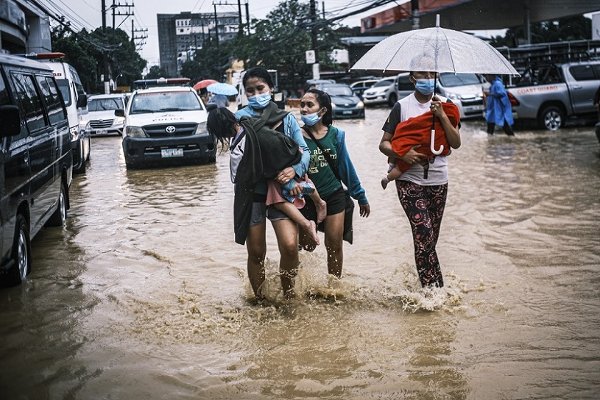It may be in poor taste to talk about politics at this time when thousands of families are still cleaning up the debris from recent storms, and in the middle of the coronavirus 2019 (COVID-19) pandemic at that. But then, these disasters present opportunities for us to evaluate the competence of the politicians around us and be guided by it in choosing our future leaders.
One destructive typhoon after another that battered Luzon in a few days tested not only the resilience of Filipinos, particularly those in calamity-prone areas, but also the capacity of government officials to quickly and efficiently respond to emergency situations.
From Typhoon Quinta in late October, followed in close succession by Rolly, Siony and Tonyo, to Ulysses on Nov. 12, the sufferings of residents of provinces along the typhoon belt, particularly those in the Bicol region and Quezon, were unimaginable. Many lost their homes and livelihood.
Amid all these, reports in mainstream and posts on social media platforms showed elected and appointed officials who were quick to act on calls for help on one hand and, on the other hand, those who were insensitive to the sufferings of typhoon victims and opportunists who made sure they would be credited for token relief goods sent to affected areas.
Photos of houses submerged in floodwater, infants and old people waiting for rescuers on rooftops, and cars floating on the road paint heart-breaking scenes of despair and disgust over the apparent lack of coordination among government agencies to facilitate evacuation, and later rescue, of people trapped in their homes.
While we have seen a number of politicians who tirelessly attended to the urgent needs of calamity victims, there were also those who were quick to blame other people for the devastation.
It thus becomes unavoidable to talk about politics and our future amid these calamities, given that the next national and local elections are just 18 months away and those seeking re-election or running for a new term are already positioning to get noticed.
How government leaders, both elected and appointed, are responding to the effects of the typhoons should serve as reminders to every voter the next time they troop to the polling places in 2022.
I’ve always believed that choosing competent leaders to vote in any election, not only for government positions, is one of the most important obligations of a citizen to the country.
Considering that those suffering most from the destruction of the typhoons, as well as from the COVID pandemic, are the poor families who comprise the bulk of voters, we should learn from the mistakes of electing those who become generous only during the campaign season and who keep on breaking their campaign promises.
President Rodrigo Duterte showed he was sensitive to public criticism when he boarded a chopper on Thursday with Sen. Bong Go, and conducted an aerial inspection of Marikina City and towns of Rizal province that were submerged in deep flood due to continuous rainfall brought by Typhoon Ulysses.
This was after his absence from public view was heavily criticized when Typhoon Quinta and Rolly ravaged mostly the Bicol region, Quezon, and southern Luzon provinces less than two weeks prior.
The hashtag “nasaan ang pangulo” became viral on social media from the time Quinta struck until Thursday morning when Ulysses unleased its fury with howling winds and dumped rains that raised the water level in Marikina River higher than that of Ondoy in 2009.
But many were not satisfied with Duterte’s brief public appearance and the directives he had given to disaster management officials, probably because the people were used to seeing the president and key Cabinet officials doing the rounds and actively addressing emergency situations during calamities.
It did not help that Duterte said in a public address on Thursday that he wanted “to swim” with residents of Marikina City and nearby Rizal towns, many of whom found refuge on rooftops of three-story houses. Some said they did not feel the compassion despite the assurance that he had mobilized all agencies to help the victims.
At 75, Duterte should be resting at home with his family during calamities. That is, if he is an ordinary senior citizen, and not the president of a country often visited by heavy storms and other disasters. Palace Spokesman Harry Roque also failed to convince many with his assurance that the president was on top of the situation even as he was attending a virtual ASEAN summit. People are looking for action and not mere words.
On the other side of the political fence, there was Vice President Leni Robredo who was “on the go” and mingling with children in an evacuation center, telling her how they survived the flooding. The vice president is still relatively young, active, responsive and compassionate in bringing government services closer to them despite the meager budget that the administration allies provide for her office compared with several billions of pesos at the disposal of the president.
Given the efficiency and competence that the Office of the Vice President shows during disasters, donors have found it as a trusted conduit for assistance to those who need help most.
The string of disasters that have struck the country in the middle of a pandemic showed us reasons to choose competence over popularity in the next elections when we vote for national down to the barangay leaders.
For sure, Filipinos will rise again from the devastation of the typhoons, but we need to be more discerning to save the country from a government that is the biggest disaster of all.
The views in this column are those of the author and do not necessarily reflect the views of VERA Files. This column also appeared in The Manila Times.
